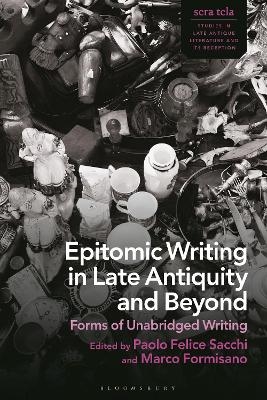
Epitomic Writing in Late Antiquity and Beyond
Bloomsbury Academic (Verlag)
978-1-350-28197-4 (ISBN)
The volume is divided into five sections: the first showcases the broad range of fields from which epitomic analysis can be made, from classics to postmodernism to cultural memory studies; the second focuses in on epitome as dismemberment in writing from late antiquity to the modern day; the third considers a 'productive negativity' of epitomic writings and how they are useful tools for investigating the very borders and paradoxes of language; the fourth brings this to bear on materiality; the fifth considers re-composition as a counterpart to dismemberment and problematises it.
Across the volume, examples are taken from important late antique writers such as Ausonius, Clement of Alexandria, Macrobius, Nepos, Nonius Marcellus and Symphosius, and from modern authors such as Antonin Artaud, Barthes, Nabokov and Pascal Quignard. Epitomic writings about art from decorated tabulae to sarcophagi are also included, as are epitomic images themselves in the form of manuscript illustrations that sum up their text.
Paolo Felice Sacchi is a researcher at Ghent University, Belgium. Marco Formisano is Professor of Latin Literature at Ghent University, Belgium. He has published extensively on late antique literature, both prose and poetry, Greek and Roman technical and scientific texts, early Christian martyr acts and classical reception. His publications include Un-learning the Classics: Studies in Late Latin Textuality.
Preface
Introduction Paolo F. Sacchi and Marco Formisano (Ghent University, Belgium)
I. Epitomic Dimensions
1. Pascal Quignard’s Little Treatises: (Anti)odern Epitomes? Irena Kristeva (University of Sofia, Bulgaria)
2. Ausonius Epitomist: Encyclopaedism and Ordering Knowledge in Late Antique Gaul Brian P. Sowers (City University of New York, USA)
3. Cato Capitulatim: Nepos the Censor Jared Hudson (Harvard University, USA)
4. Epitome and Its Surroundings Between Written and Figural Domain Paolo Liverani (University of Florence, Italy)
5. Sarcinatorem esse summum: Nonius Marcellus and the Modern Editor as Textual Frankensteins M. Payne (Leiden University, the Netherlands)
II. From the All to the Fragments?
6. The Dismembered Truth: Pentheus Dismembered as an Image of the Stromateis Antoine Paris (University of Paris-Sorbonne/ University of Montréal, France/Canada)
7. Barthes' Dream at the Collège de France: From Critical Fragments to Literary Re-compositions Mohammad Reza Fallah Nejad (University of Ahvaz, Iran)
III. Aenigma and Silence
8. Epitomizing Silence: the Apophthegmata Patrum as an Impossible Encyclopaedia of Unknowing Jesús Hernández Lobato (University of Salamanca, Spain)
9. Dionysius’ Imaginary Library Virginia Burrus (Syracuse University, USA)
10. The Kaleidoscopic World of Symphosius’ Aenigmata Philip Hardie (Cambridge University, UK)
IV. Materiality
11. 'Disfigured' Writing? The Case of A. Artaud's 503 Notebooks Ana Kiffer (Pontifical Catholic University of Rio, Brazil)
12. Visual Epitome in Late Antique Art Jas Elsner (University of Oxford, UK)
V. From the Fragments to the All?
13. The Aeneid More or Less: The Argumenta of the ‘Twelve Wise Men’ Scott McGill (Rice University, USA)
14. A Stubborn Chronophobia. Re-composition, Time and Memory in Pliny the Younger’s Epistulae and Vladimir Nabokov’s Speak Memory Tim Noens (Ghent Univeristy, Belgium)
| Erscheinungsdatum | 05.10.2022 |
|---|---|
| Reihe/Serie | sera tela: Studies in Late Antique Literature and Its Reception |
| Zusatzinfo | 30 colour illus |
| Verlagsort | London |
| Sprache | englisch |
| Maße | 156 x 234 mm |
| Themenwelt | Literatur ► Klassiker / Moderne Klassiker |
| Geschichte ► Allgemeine Geschichte ► Vor- und Frühgeschichte | |
| Geisteswissenschaften ► Sprach- / Literaturwissenschaft ► Anglistik / Amerikanistik | |
| Geisteswissenschaften ► Sprach- / Literaturwissenschaft ► Literaturwissenschaft | |
| ISBN-10 | 1-350-28197-2 / 1350281972 |
| ISBN-13 | 978-1-350-28197-4 / 9781350281974 |
| Zustand | Neuware |
| Informationen gemäß Produktsicherheitsverordnung (GPSR) | |
| Haben Sie eine Frage zum Produkt? |
aus dem Bereich


